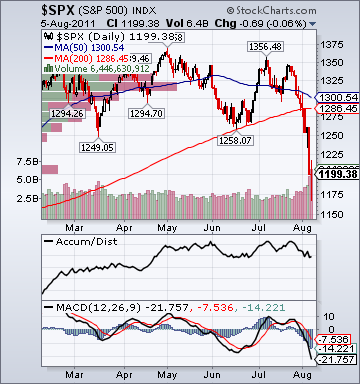Broad Market Tone: - Advance/Decline Line: Lower
- Sector Performance: Mixed
- Volume: Heavy
- Market Leading Stocks: Underperforming
Equity Investor Angst: - VIX 32.23 +1.80%
- ISE Sentiment Index 85.0 +21.43%
- Total Put/Call 1.29 +.78%
- NYSE Arms .57 -87.21%
Credit Investor Angst:- North American Investment Grade CDS Index 105.78 +5.35%
- European Financial Sector CDS Index 192.75 +12.37%
- Western Europe Sovereign Debt CDS Index 296.17 +.45%
- Emerging Market CDS Index 252.45 +10.46%
- 2-Year Swap Spread 25.0 unch.
- TED Spread 27.0 +1 bp
Economic Gauges:- 3-Month T-Bill Yield .00% unch.
- Yield Curve 226.0 +7 bps
- China Import Iron Ore Spot $178.0/Metric Tonne +.06%
- Citi US Economic Surprise Index -76.10 +11.9 points
- 10-Year TIPS Spread 2.24% +3 bps
Overseas Futures: - Nikkei Futures: Indicating -15 open in Japan
- DAX Futures: Indicating +69 open in Germany
Portfolio:
- Slightly Higher: On gains in my Retail sector longs, emerging market shorts and ETF hedges
- Disclosed Trades: Covered all of my (IWM)/(QQQ) hedges and some of my (EEM) short, then added back some (IWM)/(QQQ) hedges
- Market Exposure: Moved to 75% Net Long
BOTTOM LINE: Today's overall market action is slightly bearish as the S&P 500 could not gain upside traction this afternoon on rising eurozone debt angst, US tax hike/debt downgrade concerns, financial sector pessimism, emerging market inflation fears and global growth worries. On the positive side, Utility, Medical Equipment, Drug, Food, Tobacco, Computer Service and Networking shares are higher on the day. Large-cap growth shares are also holding up well. The UBS-Bloomberg Ag Spot Index is falling -.37%. The 10-year yield is surging +15 bps to 2.55%. The Spain sovereign cds is falling -5.93% to 404.07 bps, the Portugal sovereign cds is falling -5.9% to 916.94 bps and the Ireland sovereign cds is falling -8.48% to 771.26 bps. On the negative side, Coal, Alt Energy, Oil Service, Bank, I-Banking, Education, Gaming and REIT shares are under significant pressure, falling more than -1.5%.
Gold is +.55%, oil is rising +.55% and Copper is down -2.74%. Rice is rising +.25% and is still near a multi-year high, soaring about +26.0% in less than 1 month. The US price for a gallon of gas is unch. today at $3.70/gallon. It is up .56/gallon in less than 5 months. The Brazil sovereign cds is rising +9.59% to 130.17 bps, the Hungary sovereign cds is soaring +15.94% to 362.78 bps, the Russia sovereign cds is rising +9.7% to 173.33 bps, the France sovereign cds is rising +.65% to 144.83 bps and the Germany sovereign cds is rising +2.60% to 74.21 bps. The Italy sovereign cds has soared +172 bps in 11 days. The Hungary sovereign cds is breaking out. The France sovereign cds is making a new record high again today. The German sovereign cds is hitting another multi-year high and is only 19.0 bps from its Feb. 09 high of 93.0 bps. The Eurozone Financial Sector CDS Index is now only 17.0 bps from its March 09 record high. The 2-Year Euro Swap Spread soared +16 bps today to a multi-year high of 92.25 bps. India's Sensex fell another -2.2% last night, which leaves it down -15.6% ytd. Australia fell -4.2% and is now down -14.0% ytd. Turkey plunged -5.2% and is down -14.8% ytd. Germany's DAX has broken down badly over the last 5 days and is now down -9.8% ytd. Italian stocks are now down -20.6% ytd and are down -28.9% from their Feb. 17th 52-week high. Gauges of investor angst spiked again today, which is a big positive. However, the surge in many key emerging markets cds is a big negative. As well, a number of key European cds rose again today despite a bounce in the currency and optimism over Italy's actions. The rumor that a US debt downgrade was coming after the close today likely kept the lid on a more vigorous upside reversal. Stocks are very oversold near-term and should start bouncing meaningfully by early next week. However, the underlying problems in the eurozone remain and emerging markets growth fears are becoming more pronounced. I expect US stocks to trade modestly higher into the close from current levels on short-covering, technical buying and bargain-hunting.
